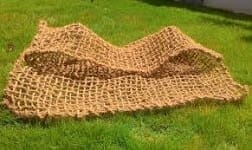The
government is banking on coir geotextiles to pull the flagging coir industry in
the state out of the woods and to regain its lost glory. “ We expect to get Rs
100 crore order for geotextiles from together from all the local panchayats
under Mahatma Gandhi national rural employment guarantee scheme (MGNREGS),’’ he
said.
Geo textile as an eco-friendly product finds
wide use in road construction, soil and water conservation, sloping landscape
and coastline erosion control, river bank protection and in mining sites. “
The union transport minister wants 40,000 tonnes of geo textiles annually,
which we are not in a position to supply at present. I will be calling a
meeting of coir ministers of southern states next year to collectively lobby
for geotextiles,’’ he said.
Apart from geotextiles, the state will promote coir pith, coir acoustics, mulching sheets, coir composites and binder less boards, the minister said. It has set up a pilot plant for coir composites with Western India Plywood’s in Kannur. It is also expecting significant domestic sales by partnering with big retail chains like Reliance and Shoppers Stop
Kerala has to make yarn, despite a plunge in its export, to protect the employment of about 1 lakh coir workers, majority of whom are women. “ While increasingly going for automation in the industry we also have to bear a cost of transition by subsidizing the traditional coir workers,’’ he said.
Kerala which was dependent on Tamil Nadu for 50% of its fibre requirement now is self-reliant to the extent of 50% and hopes to triple the yarn production to 60,000 tonnes in two years. Around 300 fibre automated extraction mills are also planned.
An investment of Rs 1400 crore is planned in the 13th five year plan for coir industry which includes 1106 crore plan allocation and Rs 204.83 crore national cooperative development corporation (NCDC) loan.

